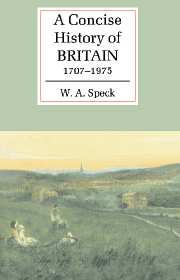Book contents
- Frontmatter
- Dedication
- Contents
- List of illustrations
- Preface
- Introduction
- 1 Eighteenth-century Britain
- 2 From the Anglo-Scottish Union to the Union with Ireland
- 3 Nineteenth-century Britain
- 4 From Pitt to Palmerston
- 5 From the second Reform Act to the Boer War
- 6 Twentieth-century Britain
- 7 From the Boer War to the first Labour government
- 8 From Baldwin to Attlee
- 9 From the accession of Queen Elizabeth to the entry into the European Economic Community
- Epilogue
- Appendix: Monarchs and ministries, 1707–1976
- Guide to further reading
- Index
4 - From Pitt to Palmerston
Published online by Cambridge University Press: 05 June 2014
- Frontmatter
- Dedication
- Contents
- List of illustrations
- Preface
- Introduction
- 1 Eighteenth-century Britain
- 2 From the Anglo-Scottish Union to the Union with Ireland
- 3 Nineteenth-century Britain
- 4 From Pitt to Palmerston
- 5 From the second Reform Act to the Boer War
- 6 Twentieth-century Britain
- 7 From the Boer War to the first Labour government
- 8 From Baldwin to Attlee
- 9 From the accession of Queen Elizabeth to the entry into the European Economic Community
- Epilogue
- Appendix: Monarchs and ministries, 1707–1976
- Guide to further reading
- Index
Summary
When Pitt indicated that he intended the Act of Union to give Catholics full emancipation George III refused to concede it. The king's refusal led the prime minister to resign in 1801. Pitt's resignation appears to demonstrate that the crown retained ultimate authority despite recent constitutional changes. Certainly to George it was a matter of principle that he had sworn to uphold the Protestant constitution in church and state, and he regarded Catholic emancipation as a breach of his coronation oath. Yet had Pitt chosen to resist the royal will on this issue it is hard to see how the king could have withstood him. The ministry of Henry Addington which replaced him was very narrowly based and really only lasted as long as the former premier refused to oppose it. When Pitt did offer opposition, Addington fell and was replaced by his predecessor. Pitt's second ministry came to an unexpected end in 1806 with his early death at the age of forty-five.
Pitt died in the middle of the most titanic struggle Britain ever fought against a foreign foe. The war declared by France in 1793 lasted twenty-two years, with only one short breathing space, the Peace of Amiens negotiated in 1801, which broke down in 1803. Although the wars against Louis XIV had been nearly as protracted they had not seen Britain virtually isolated and in serious danger of a French invasion.
- Type
- Chapter
- Information
- A Concise History of Britain, 1707–1975 , pp. 65 - 88Publisher: Cambridge University PressPrint publication year: 1993



